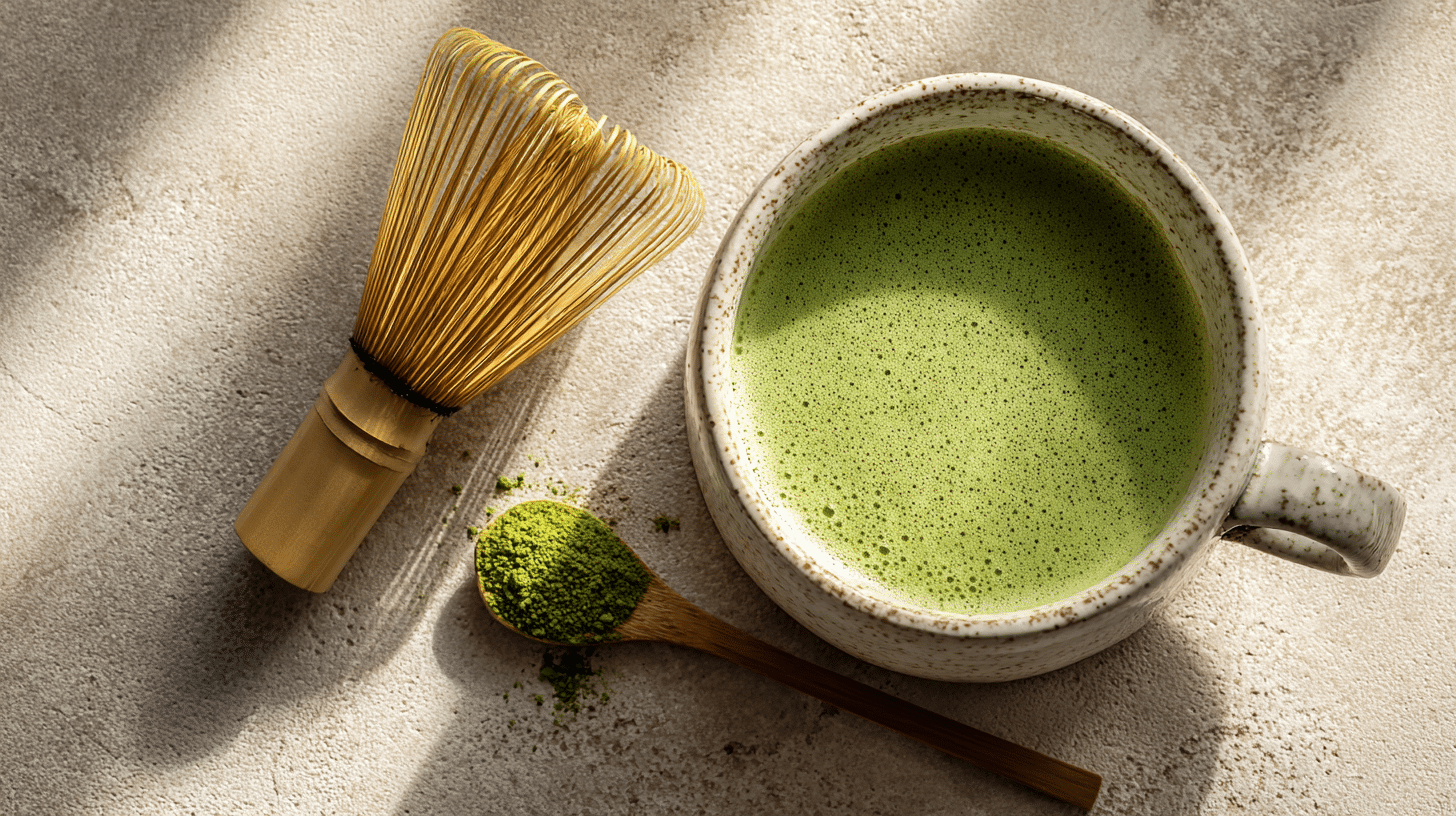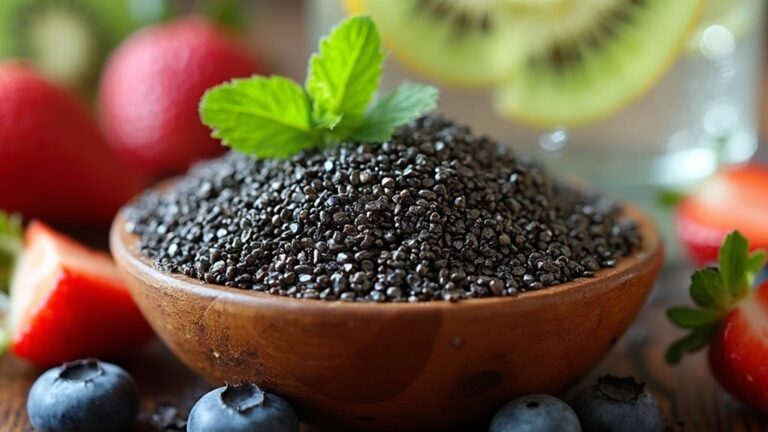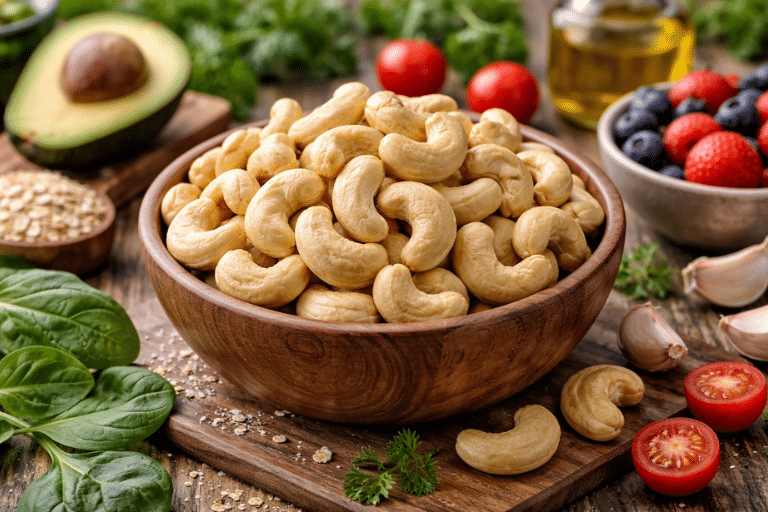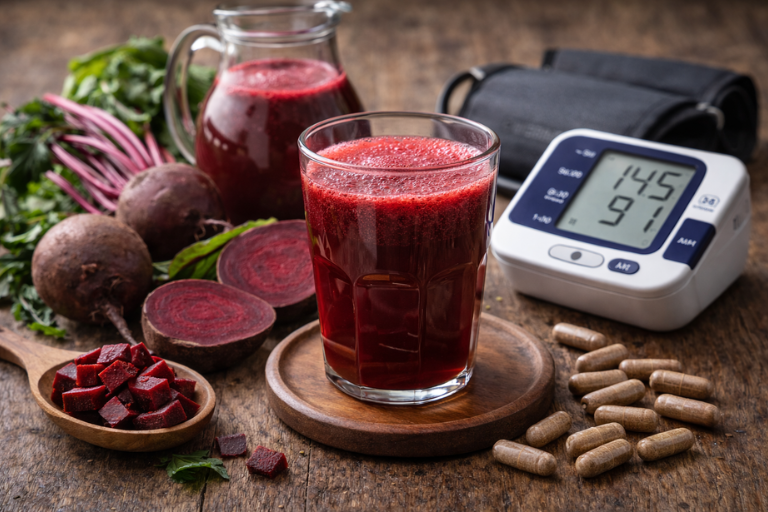Top 13 Health Benefits of Matcha Tea

You’ve probably heard matcha called a superfood, but what makes this vibrant green powder so special? Beyond its Instagram-worthy appearance, matcha delivers a concentrated dose of health benefits that can transform your daily routine. From boosting brain function to torching fat and fighting inflammation, this ancient Japanese tea offers 13 compelling reasons to make it part of your lifestyle. Here’s what science reveals about matcha’s remarkable impact on your body and mind.
Packed With Powerful Antioxidants
While many foods claim antioxidant benefits, matcha stands out as an exceptional powerhouse that delivers up to 30% of its dry mass in polyphenols.
Matcha provides significantly more antioxidants per serving than traditional green tea because it uses the entire leaf in powdered form instead of just extracting compounds into water.
When you drink properly prepared matcha, you’re getting radical scavenging activities above 88% for DPPH and 90% for ABTS tests.
The star compound, epigallocatechin gallate (EGCG), can reach concentrations of 95.48 mg/g. Research shows that optimal extraction occurs at 80°C for 20 minutes with a 100 mL/g liquid-to-solid ratio to maximize these beneficial compounds.
These antioxidants work as free radical scavengers, neutralizing harmful molecules that cause cellular damage.
With Matcha tea, you can benefit from reduced oxidative stress, enhanced immune function, and improved detoxification pathways that help prevent chronic diseases.
Enhances Cognitive Function and Memory
You can experience sharper mental clarity when you drink matcha regularly, thanks to its unique combination of L-theanine and caffeine that work together to enhance focus without the jitters.
Your memory retention can improve greatly through matcha’s powerful antioxidants like EGCG, which protect your brain cells from oxidative stress and inflammation. Research indicates that drinking matcha tea is linked to a reduced risk of cognitive impairment in older adults.
Studies show that you’re likely to see better performance on cognitive tests and improved reaction times when you make matcha part of your daily routine.
Boosts Mental Clarity
When you drink matcha, you’re consuming a powerful combination of caffeine and L-theanine that creates a unique cognitive enhancement unlike any other beverage.
This synergy produces a state called “relaxed alertness” by increasing alpha brain waves in your brain. You can experience improved focus and concentration without the typical jitteriness or anxiety that comes with caffeine alone.
The L-theanine in matcha helps mellow out the jittery effects of caffeine, letting you stay focused and clear-headed for longer periods.
Additionally, matcha’s high levels of EGCG antioxidants protect your brain cells from oxidative stress, supporting long-term cognitive health. Research shows that matcha consumption may be particularly beneficial for older adults experiencing cognitive decline, as nutrition plays a crucial role in preventing dementia during preclinical stages.
This compound also reduces psychological stress and anxiety, which directly contributes to clearer thinking and enhanced mental performance throughout your day.
Improves Memory Retention
Beyond sharpening your immediate focus, matcha’s unique compound profile actively strengthens your brain’s ability to form and retrieve memories.
You can benefit from matcha’s exceptionally high L-theanine content—up to 5 times more than regular green tea—which enhances memory retention while promoting calm alertness. The powerful antioxidant EGCG protects your neurons from oxidative stress that typically impairs memory function.
Studies have shown that matcha really works. Participants in the research improved their scores on delayed recall tests and did better on verbal memory tasks after drinking matcha daily for 12 weeks.
You’re getting concentrated neuroprotective compounds since you consume the entire leaf powder rather than just brewed water. This synergistic combination of caffeine and L-theanine improves your working memory capacity, allowing better information storage and faster memory retrieval during cognitive tasks. EGCG may also promote new neuron growth in the hippocampus, the brain region most critical for memory formation and consolidation.
Provides Neuroprotective Effects
Your brain faces constant threats from inflammation and cellular damage that can accelerate aging and increase disease risk.
Matcha’s powerful compounds actively shield your neural cells from these harmful processes while reducing inflammatory responses throughout your brain tissue.
These protective effects also boost your brain’s ability to form new connections and adapt, enhancing synaptic plasticity that’s essential for learning and memory retention. The high EGCG content in matcha provides additional cognitive protection by potentially safeguarding against neurodegenerative diseases.
Reduces Brain Inflammation
Although brain inflammation can silently damage cognitive function over time, matcha’s powerful compounds actively combat this threat through multiple protective mechanisms.
You can benefit from matcha’s EGCG, which targets specific neuroinflammation pathways while reducing systemic inflammation that impacts your brain. The green tea powder also alleviates hypothalamic microglial hyperplasia and activation, directly addressing inflammation at its source. Additionally, incorporating mindful meditation into your routine can enhance emotional regulation, further supporting cognitive health.
Research demonstrates that matcha’s combination of epigallocatechin gallate, theanine, and caffeine provides comprehensive neuroprotective benefits for older adults experiencing cognitive concerns.
Matcha’s anti-inflammatory properties extend beyond basic protection:
- Pollution Defense: Matcha extracts reduce inflammation caused by PM2.5 exposure, protecting your brain from environmental toxins.
- Cholinergic Support: Matcha can enhance cognitive function by supporting your cholinergic system, which inflammation often compromises.
- Systemic Relief: The reduction in whole-body inflammation creates a healthier environment for ideal brain function.
Protects Neural Cells
Matcha’s neuroprotective power goes far beyond reducing inflammation—it directly shields your brain cells from the molecular damage that leads to cognitive decline and neurodegenerative diseases.
The high concentration of EGCG in matcha neutralizes free radicals that would otherwise damage your neurons through oxidative stress. This antioxidant prevents lipid peroxidation in your brain cell membranes, maintaining their structural integrity and function.
Matcha also tackles Alzheimer’s pathology by reducing amyloid beta aggregation, the toxic protein clusters that kill neurons.
Meanwhile, it upregulates BDNF expression, supporting your neurons’ survival and synaptic plasticity. The catechins enhance insulin-degrading enzyme activity, helping clear neurotoxic proteins from your brain.
This extensive cellular protection promotes neural longevity and resilience against age-related damage.
Enhances Synaptic Plasticity
While protecting your brain cells from damage represents just one layer of matcha’s cognitive benefits, the green tea powder takes neuroprotection further by actively enhancing your brain’s ability to form new connections and adapt throughout your lifetime.
EGCG in matcha activates vital signaling pathways like IRS/Akt and Erk/CREB/BDNF, which directly support synaptic plasticity in your hippocampus. This means your brain can literally rewire itself more effectively, forming stronger neural pathways for learning and memory. The compound increases expression of genes involved in long-term synaptic changes while boosting neurotrophic factors that promote neuronal growth.
Research demonstrates that matcha’s cognitive benefits extend to sleep quality, with studies showing improvements in both cognitive function and rest patterns when consumed regularly.
- Memory enhancement: Regular matcha consumption improves your focus, memory retention, and overall cognitive performance
- Cognitive resilience: Slows age-related cognitive decline by maintaining neuronal circuit adaptability
- Social cognition: Enhances emotional perception and facial recognition abilities
Reduces Stress and Promotes Relaxation
When stress levels spike throughout your day, matcha’s unique amino acid profile works to counteract anxiety without the jittery side effects you’d typically experience from caffeine alone.
L-theanine, matcha’s star component, increases calming alpha brain waves while modulating key neurotransmitters like GABA, dopamine, and serotonin. This creates a state of “calm alertness” that effectively reduces both psychological and physiological stress markers. The amino acid arginine found in matcha also contributes to these stress-reducing effects.
Clinical studies demonstrate matcha’s stress-busting power. Pharmacy students consuming 3 grams daily showed notably lower anxiety levels and reduced salivary α-amylase—a key stress biomarker.
The EGCG antioxidants further combat oxidative stress and inflammation in your brain, supporting neural resilience. For ideal stress reduction, you’ll want matcha with a caffeine-to-theanine ratio of 2 or less, ensuring balanced stimulation without overstimulation.
Improves Synaptic Plasticity
Beyond calming your mind, matcha actively rewires your brain’s neural networks by enhancing synaptic plasticity—your brain’s remarkable ability to strengthen and reorganize connections between neurons.
When you drink matcha, you’re delivering powerful compounds that boost your working memory and cognitive performance.
The EGCG catechins in matcha cross your blood-brain barrier and increase synaptic plasticity-related protein expression in your hippocampus, the brain region essential for learning and memory.
Meanwhile, L-theanine facilitates your brain’s adaptation to new experiences while boosting neurotransmitter levels like GABA and dopamine. MRI studies demonstrate that green tea extract creates measurable changes in brain connectivity patterns.
- Enhanced connectivity between your parietal and frontal cortex improves working memory performance
- Increased gene expression supports formation and strengthening of neural connections for better memory consolidation
- Elevated brain wave activity including theta waves promotes improved attention and mental clarity
Supports Heart Health and Circulation
Beyond matcha’s brain-boosting properties, you’ll discover it’s equally powerful for your cardiovascular system.
The same compounds that enhance mental clarity also work to protect your heart and improve circulation throughout your body.
You’ll find that matcha’s impact on blood pressure and cholesterol levels makes it a valuable addition to any heart-healthy lifestyle. These benefits stem from matcha’s exceptionally high concentration of EGCG, a powerful catechin that directly supports cardiovascular health through multiple mechanisms.
Improves Blood Pressure
As you sip your daily matcha, you’re consuming powerful catechins that actively work to lower your blood pressure and support cardiovascular health.
These antioxidants reduce oxidative stress while relaxing your blood vessels, improving vascular function naturally. Clinical studies show consistent matcha consumption can decrease systolic blood pressure by about 2 mm Hg and diastolic pressure by 1.9 to 2.4 mm Hg.
Long-term matcha intake provides sustained benefits, with 12-week studies demonstrating significant blood pressure reductions in hypertensive individuals. The catechins inhibit ACE enzymes, promoting vasodilation and better circulation.
- Moderate consumption yields ideal benefits—excessive intake may raise blood pressure due to caffeine.
- Consult your doctor if you’re taking blood pressure medications to avoid interactions.
- Consistency matters—daily consumption for 12+ weeks produces the most pronounced effects.
Helps Manage Cholesterol Levels
Managing cholesterol levels becomes more achievable when you incorporate matcha into your daily routine, as this vibrant green powder contains powerful catechins that actively work to improve your cholesterol profile.
These potent antioxidants inhibit cholesterol absorption in your intestines while enhancing LDL receptor activity in your liver, promoting better cholesterol clearance from your bloodstream. You’ll benefit from increased HDL (“good”) cholesterol and reduced LDL (“bad”) cholesterol levels. Over 20 clinical trials support green tea’s effectiveness in managing harmful cholesterol.
- Blocks absorption: Catechins prevent cholesterol uptake in your intestines, reducing total cholesterol by up to 14.4%.
- Boosts good cholesterol: Regular consumption increases HDL levels while lowering LDL cholesterol by 30.4%.
- Prevents oxidation: Antioxidants combat LDL oxidation, reducing atherogenic risk and supporting cardiovascular health. Additionally, incorporating matcha may also provide immune system support, enhancing your overall health during cold and flu season.
Promotes Healthy Gut Microbiome
Beyond its cholesterol-managing capabilities, matcha actively transforms your gut microbiome by delivering powerful polyphenols that function as natural prebiotics. These compounds promote beneficial bacteria growth while controlling harmful microorganisms, improving your overall gut diversity—a key marker of digestive health.
When you consume matcha regularly, you’re modulating your gut-liver axis through enhanced bile acid and short-chain fatty acid metabolism. This process helps regulate lipid metabolism and strengthens gut-host communication pathways. The improved microbial balance reduces obesity-related dysbiosis and systemic inflammation.
Your enhanced gut microbiome from matcha intake also supports cardiovascular health by reducing atherosclerosis risk and improving vascular function.
Additionally, the healthier bacterial environment influences your brain-gut axis, potentially improving mood and cognitive function while reducing stress responses through neuroimmune signaling pathways.
Supports Liver Health and Detoxification
While matcha strengthens your gut microbiome, it simultaneously provides powerful hepatoprotective effects that shield your liver from damage and enhance its natural detoxification processes.
When you consume matcha regularly, you’re delivering potent catechins like EGCG that neutralize harmful free radicals attacking your liver cells. This antioxidant action prevents lipid peroxidation in liver membranes while reducing oxidative stress markers.
Matcha’s liver-supporting benefits include:
- Reduces fatty liver progression – Decreases hepatic fat accumulation and improves lipid metabolism in high-fat diet conditions.
- Enhances detoxification capacity – Increases glutathione levels and upregulates cytochrome P450 enzymes for better toxin processing.
- Protects against liver injury – Lowers aminotransferase enzymes and inflammatory cytokines that signal liver damage.
You’ll also experience improved bile acid profiles and enhanced metabolic homeostasis.
Aids in Weight Management
As matcha works to protect and detoxify your liver, it simultaneously activates powerful metabolic pathways that support healthy weight management through multiple mechanisms.
The catechins, particularly EGCG, enhance thermogenesis—your body’s heat production process—increasing overall calorie burning. With 38-89 mg of caffeine per cup, matcha boosts metabolism without coffee’s intensity.
Consuming 1-4 cups daily can considerably reduce body fat composition, especially abdominal fat when paired with exercise. Three cups may help you lose 3 pounds over three months.
Matcha also regulates your gut microbiome and improves bile acid metabolism, supporting healthier digestion. For best results, drink matcha before workouts to enhance fat oxidation during exercise. Combined with healthy eating and regular activity, matcha reinforces positive lifestyle habits while supporting long-term metabolic health. Additionally, its effects are amplified when combined with high-intensity interval training, which significantly contributes to sustained fat loss.
Boosts Metabolism and Fat Burning
When you consume matcha, its powerful combination of EGCG and caffeine creates a metabolic synergy that considerably enhances your body’s fat-burning capabilities.
This dynamic duo markedly increases thermogenesis and fat oxidation, elevating your energy expenditure beyond what you’d experience with a placebo.
Research shows that consuming 1-4 grams of matcha daily can decrease your body fat percentage and specifically target abdominal fat reduction.
However, you’ll see the most dramatic results when you combine matcha with exercise. A 2021 study found that women who took 3 grams daily with regular brisk walks experienced increased fat oxidation rates, while matcha alone showed limited impact.
- Pre-workout consumption: Drink matcha before exercise to maximize abdominal fat loss during your workout
- Daily dosage: Consume 1-4 grams daily for ideal fat-burning effects
- Consistency matters: Regular intake of three cups daily can result in approximately 3 pounds of weight loss over three months
May Help Prevent Cancer
Beyond its metabolism-boosting effects, matcha’s concentrated antioxidant profile positions it as a powerful ally in cancer prevention.
When you consume matcha, you’re getting whole green tea leaves packed with catechins like EGCG, which protect your cells from DNA damage that leads to cancer development.
These compounds work by suppressing cancer stem cell growth and disrupting the metabolic pathways tumors need to survive.
EGCG also inhibits angiogenesis—the process where tumors create new blood vessels—essentially starving them of nutrients needed for expansion.
Population studies show regular green tea consumption correlates with reduced risk of breast, ovarian, lung, and prostate cancers.
Matcha’s anti-inflammatory properties further support cancer prevention by addressing chronic inflammation that contributes to tumor progression.
Reduces Inflammation Throughout the Body
The anti-inflammatory compounds that help prevent cancer also work systemically throughout your body, targeting chronic inflammation that drives numerous health conditions.
EGCG, matcha’s primary catechin, inhibits nuclear factor-kappa B (NF-kB), a protein complex that regulates immune responses. This inhibition reduces production of inflammatory cytokines and modulates tumor necrosis factor-alpha.
Your body experiences measurable improvements when you consume matcha regularly. It lowers C-reactive protein levels, reduces interleukin-6, and modulates inflammatory enzymes like COX-2.
The powerful antioxidants scavenge reactive oxygen species that damage cells and perpetuate inflammation. Additionally, incorporating an anti-inflammatory diet can further enhance matcha’s beneficial effects on reducing inflammation.
- Arthritis Relief: Reduces joint inflammation by interrupting inflammatory cascades and lowering cartilage degradation
- Heart Protection: Shields heart muscle from inflammation-related injury, especially beneficial for smokers
- Brain Health: Inhibits neuroinflammation in microglial cells, improving energy balance and metabolic processes
Conclusion
You’ve discovered matcha’s impressive array of health benefits, from its powerful antioxidants to its brain-boosting properties. Whether you’re looking to enhance your cognitive function, manage your weight, or reduce inflammation, matcha’s got you covered. Its unique combination of L-theanine and caffeine provides sustained energy without the jitters. By incorporating this vibrant green powder into your daily routine, you’re investing in your long-term health and well-being. Start reaping matcha’s rewards today.
References
- https://hsph.harvard.edu/news/matcha-brain-heart-gut-health/
- https://pmc.ncbi.nlm.nih.gov/articles/PMC9792400/
- https://www.healthline.com/nutrition/7-benefits-of-matcha-tea
- https://www.health.harvard.edu/staying-healthy/matcha-a-look-at-possible-health-benefits
- https://pmc.ncbi.nlm.nih.gov/articles/PMC7796401/
- https://pmc.ncbi.nlm.nih.gov/articles/PMC7231151/
- https://bioresources.cnr.ncsu.edu/resources/optimized-green-extraction-conditions-of-matcha-green-tea-camellia-sinensis-using-central-composite-design-for-maximal-polyphenol-and-antioxidant-contents/
- https://www.mdpi.com/2076-3417/11/11/5087
- https://ujimatchatea.com/blogs/news/matcha-and-brain-health
- https://journals.plos.org/plosone/article?id=10.1371/journal.pone.0309287






